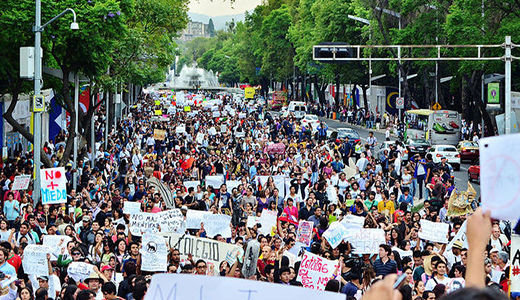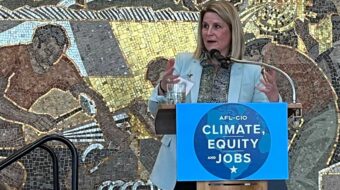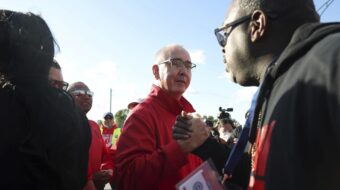
ATLANTA – Leaders and members of every single union in America packed a town hall meeting here Tuesday night to witness the launching of the AFL-CIO’s national plan to kill both fast track trade legislation and the Trans Pacific Partnership trade deal associated with it.
Robert Reich, former labor secretary during the Clinton administration and now a professor at UCLA Berkeley, declared that the trade policies of the United States are undermining the interests of workers and that these trade deals have to be stopped. “This is being done behind closed doors,” he said, “and when that happens it is because the deals advance the policy interests of the economic elite, not the interests of America’s workers, small farmers, small businesses and domestic producers.”
Reich made the argument that the Trans Pacific Partnership trade policy and trade promotion authority, which would allow deals to sail through Congress with little or no discussion and no opportunity for amendment, are inextricably linked to economic policy.
This is because trade agreements, he noted, include provisions on environmental policy, labor rights, foreign investment, food safety, anti-trust policy, and more – all being kept away from the eyes of the public.
On the TPP in particular he explained: “From what little has leaked out (because they keep the details secret) we know that global corporations will be able to appeal to an international board made up of Wall Street appointees, outside the control of U.S. law, that allows the corporations to claim damages if their profits are hurt by regulations that protect consumers and workers.”
Union leaders and workers in the hall gasped when they heard that and broke out into chants demanding that lawmakers kill the TPP and fast track.
“As a teacher I’ve always placed a premium on logic and what we know,” Randi Weingarten, president of the American Federation of Teachers, told the crowd. “And what we know is that there hasn’t been a trade deal yet that benefitted the American people. She outlined how prior trade deals, from NAFTA and CAFTA to Korea and Colombia were “a mountain of broken promises made to workers.”
She explained how with NAFTA and Korea Americans were promised more jobs and higher wages because the deals would make it easier to export U.S. products. “Instead they made it easier to export American jobs,” she said because they have clauses that incentivize moving production offshore.
Mark Dimondstein, president of the American Postal Workers Union, urged the crowd not to forget “our brothers and sisters in the other countries.”
He explained how, despite promises that labor violations would be fixed in those countries, workers in Guatemala, Honduras, Mexico, and Columbia have experienced repression, often in the form of threats and violence. In addition, he noted, the floods of subsidized agricultural exports from the U.S. have driven workers and farmers from their homes and into the U.S. in search of a means of survival for their families.
The AFL-CIO outlined earlier yesterday, in a special statement on trade, what a pro-worker trade deal should encompass. Any deal, the federation says, should ensure that Congress approves trade agreement partners before negotiations begin, that there is a check on the executive branch so it cannot unilaterally determine whether the intent of Congress is being met and that there is increased access to the whole process of making trade agreements to the public.
Union leaders of almost every union in the country pledged at the town hall last night to fight both fast track authority and the TPP.
They divided up all the swing districts that are represented now by Democrats and each union took responsibility for doing different work in those districts.
Larry Cohen, president of the Communications Workers of America, for example pledged that in 17 congressional districts his members will send out 50,000 emails, make 25,000 phone calls, hand write 10,000 letters and link up with allies, including civil rights organizations and LGBTQ groups in the effort.
Leo Gerard, president of the United Steelworkers reminded the crowd that his union has a 20,000-member rapid response team. Every single one of them is writing letters, visiting lawmakers, knocking on doors and going to lobby in Washington, he said to standing ovation and cheers.
Harold Schaitberger, present of the Firefighters, pledged that his union’s political action committee, which is the 35th largest among the 567 registered PACs in America, was shutting down immediately and would not give one penny to any lawmaker who does not come out against the trade deals. His announcement was followed by still another ovation and prolonged cheers.
Roseann DeMoro, president of National Nursed United, warned that the deals could result in low quality, expensive pharmaceuticals and poor quality food sickening Americans. “We nurses will never allow our patients to be abused that way,” she declared to still more cheers and yet another standing ovation.
And the parade of union leaders went on and on with every one of them getting up to describe his or her part of what the AFL-CIO is calling its biggest effort ever to kill trade deals that it says will hurt all of America’s workers.
Below are audio clips of the leadership of the AFL-CIO promising action to stop fast track authority:
Photo: AFL-CIO Now Blog












Comments